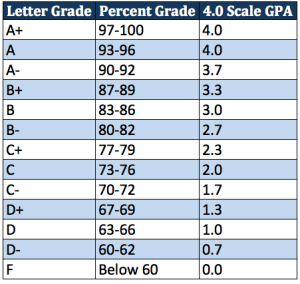You’ve gotten through syllabus week and are about a month in the semester. In that time, you already have a general idea of what classes are going to be on your good list and bad list.
Obviously the classes on your good list are going well and you can just stay the course (pun intended), but let’s address the classes on your bad list.
There comes a moment when we’ve all hit that wall in a certain course, and we ask ourselves, “Should I drop the class?”
And this is a valid question with multiple things to consider.
You don’t want to be a quitter and get in the habit of not finishing the moment things get hard. Plus, there are consequences of dropping the course, like needing to pick up another class or graduating later if this is a bad habit for you.
On the other hand, sometimes the smartest thing to do is to withdrawal before it’s too late. Dropping is a better alternative than putting yourself through unnecessary misery, failing the course, losing your scholarship, or other bad outcomes. I know many straight-A students that dropped courses for various reasons, and doing this never ceased to get in the way of their future success.
Deciding whether to stick with a course or drop it is tough in itself, and becomes harder because it’s a time-sensitive issue. You don’t want to miss the Add/Drop window when it’s too late, or drop so late in the semester that your bad grade is counted in your GPA.
Like almost everything, your decision to keep or drop a class is all about context.
But instead of making an emotional decision on a whim, first consider the following in regards to your situation, and then you’ll know when you should drop a class.
When To Drop A Class
1. Don’t Need This Course To Graduate
I’d be extra aware of the courses you’re taking only for credits and not because you need to fulfill a certain graduation requirement. Because oddly enough, these add-on classes can cause you the most trouble.
And the fact that you don’t need it to graduate can be an extra pain in your side because every day you’ll question, “How’s this class going to help me in life?” So if you can drop one of these classes and add a sprint course for the back end of the semester, go do it. No harm no foul if it’s done this way.
2. Weed Out Class For Another Major
Sometimes you get stuck in a weed out class for another major, and it’s best to get out before you get bloody. I learned this lesson the hard way.
As an English major in the College of Arts and Sciences, I had to take a 100-level microbiology course. I knew I didn’t like the subject, but thought I’d be fine since it’s a beginner’s course for freshmen. Little did I know that this course served as the main weed out class for microbiology majors.
I should have gotten the hint when the professor kept saying, “If you’re pre-med or pre-den, listen up.” Anyway, I stuck with it and ended up getting bad exam grades and my lowest overall class grade of my college career. If I was wiser, I would have dropped that baby so fast and picked a different 100-level microbiology class.
3. Professor Is A Joke
The cranky old man, the teacher who doesn’t care about the course or the students, and the unreasonable stickler are only a few of many types of teachers who can make for an awful semester.
I wouldn’t judge your professor on the first or second meeting though, but you should have a pretty good idea if he or she is a joke after about two weeks. Now you need to decide (with the rest of this list) if you can put up with them, or are you better off cutting the course from your schedule and moving on.
Professors often make or break a class, so don’t underestimate this element. Also, you need to connect well with a couple of teachers for an excellent recommendation letter. Keep that in mind.
4. Work Required Is Unrealistic
I’m all about hustling hard and reaping the reward at the end of it. But sometimes the work required is too much for a small gain, like getting a general education class out of the way.
So if the syllabus says on week three you have a project, paper, and exam due, then that’s unrealistic work. Also, having to read 50-100 pages a week is reasonable for your English course, but 400 pages a week is also unrealistic.
If you’re passionate about the subject and enjoy the rigorous workload, good for you. But, most students would rather lick a wall for hours compared to going through four months of over-the-top work for a course.
5. Subject Bores You To Death
Knowing you’re going to be talked to about something you could care less about for 80 minutes is the worst. Whether it’s the subject or the professor, or both, boring classes will suck the life out of you.
If it’s a class you need for your major, then fight through it and hope that it will be over soon. Or you should reconsider your plans if you’re repeatedly bored each time you take a class for your major.
However, many times students sign up for these boring classes when they can easily cross off the same graduation requirement with another course. If this is the case, save yourself the misery and switch it for another class that serves the same graduation requirement.
This is another reason why it may be helpful to sign up for extra classes, see what one is better, and then drop the other.
6. Meeting Day And Time Mess Up Your Schedule
Are you a senior who plans to interview with companies on Friday, but your professor won’t let you skip Friday class? Does a little part of you die inside during your night class when you hear the sounds of partying? Are you a night owl and the thought of your early-morning class makes you depressed?
These are a few of many scenarios where the class meeting time gets in the way of your life. Also, another decent reason to drop your class is to have time for the extracurricular activity you want to pursue. You can often learn more outside of a classroom.
For example, dropping one class to add another at a different time so you can make your student organization events can improve your life more than being annoyed and staring at a PowerPoint presentation for too long.
7. Took (Basically) The Same Class In High School
The smartest way to avoid this would have been wise to test out of it through an AP course, but it’s too late for that. Anyway, taking virtually the same course in college as you did in high school doesn’t do you any good for your future success.
Although you may think the purpose of college is to put in as little work as possible to do decent and get a degree, you’ll get a reality check when you step out into the working world without many skills and bad habits.
So it makes sense to drop a course you’ve already had to study a different subject matter. Then you’ll improve your knowledge and make your semester more meaningful.
I imagine majors like political science and history, where you might study specific time periods, are the most likely candidates for repeating courses, so watch out.
8. Failed Miserably On The First Exam Or Two
If you bombed an exam, I’m talking about a F grade (maybe a D), then you might need to drop the course for your GPA’s sake before it ruins your cumulative GPA.
Protecting your GPA is vital if you’re planning on going to grad school, consulting, investment banking, or accounting.
But if you received a C on your first exam, don’t freak out. Use The Chip Away Strategy to improve your next exam score to bounce back.
9. Missed A Long Stretch Of Classes
It’s not unusual for college students to miss multiple classes in a row thanks to an illness, injury, or something else unplanned. Depending what you missed, you can dig in to gain ground in the course or drop it altogether if you’re too far behind.
A student who misses one or two weeks of classes is in a hole, but can most likely come back from it. Missing a month of class and your shot at catching up to any degree is probably zero.
If you’re still unsure if you can make up all the work you missed, simply visit office hours and ask your professor. I bet they’ll give you an honest response and tell you if they think you should drop the course.
Related: Overcome Failing A Test With The 3 R Strategy



